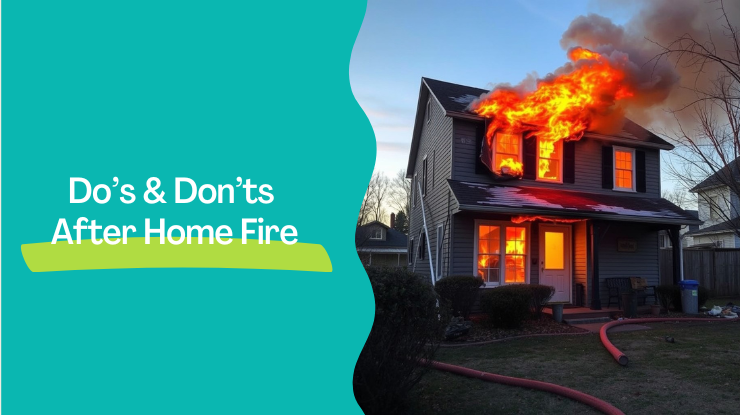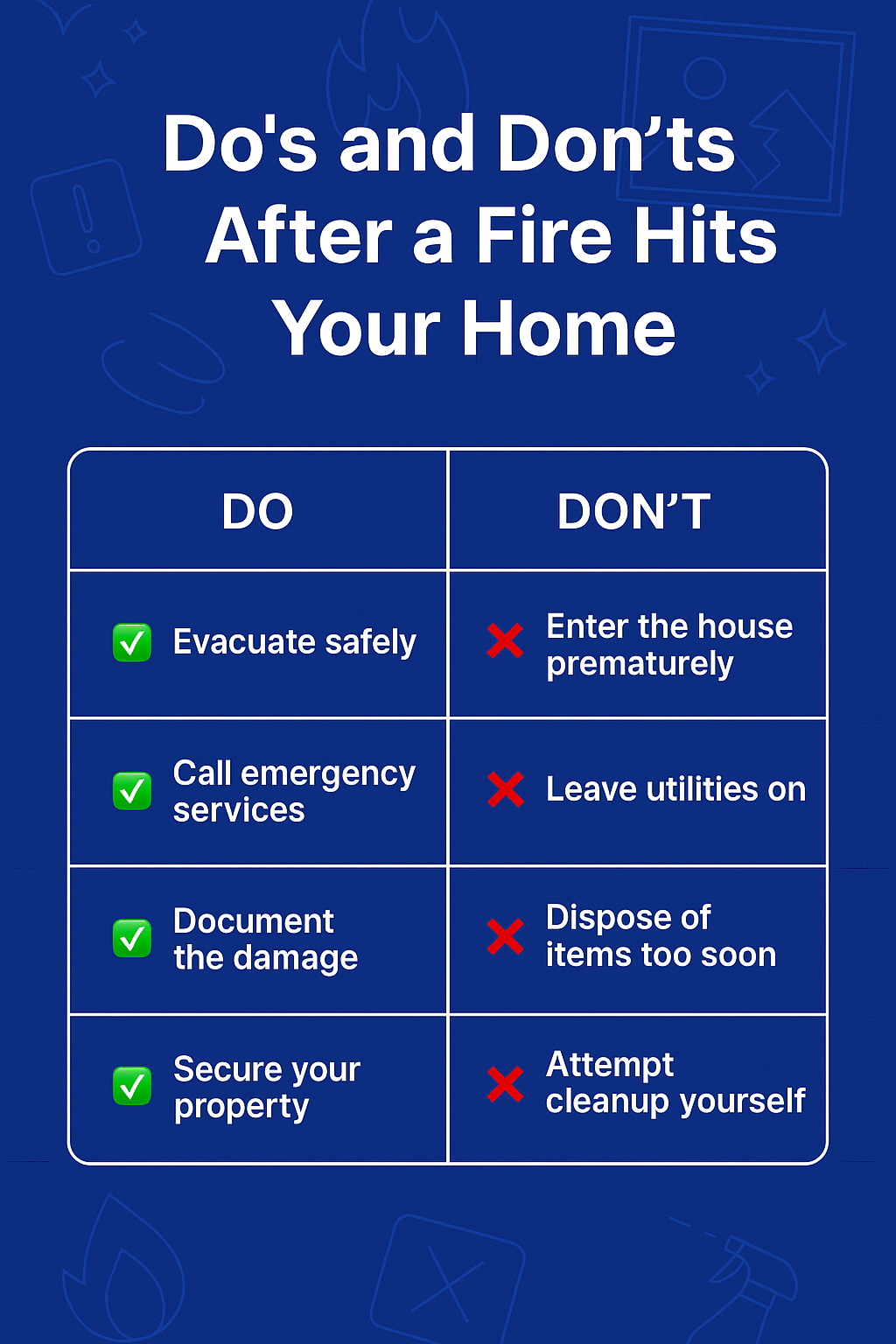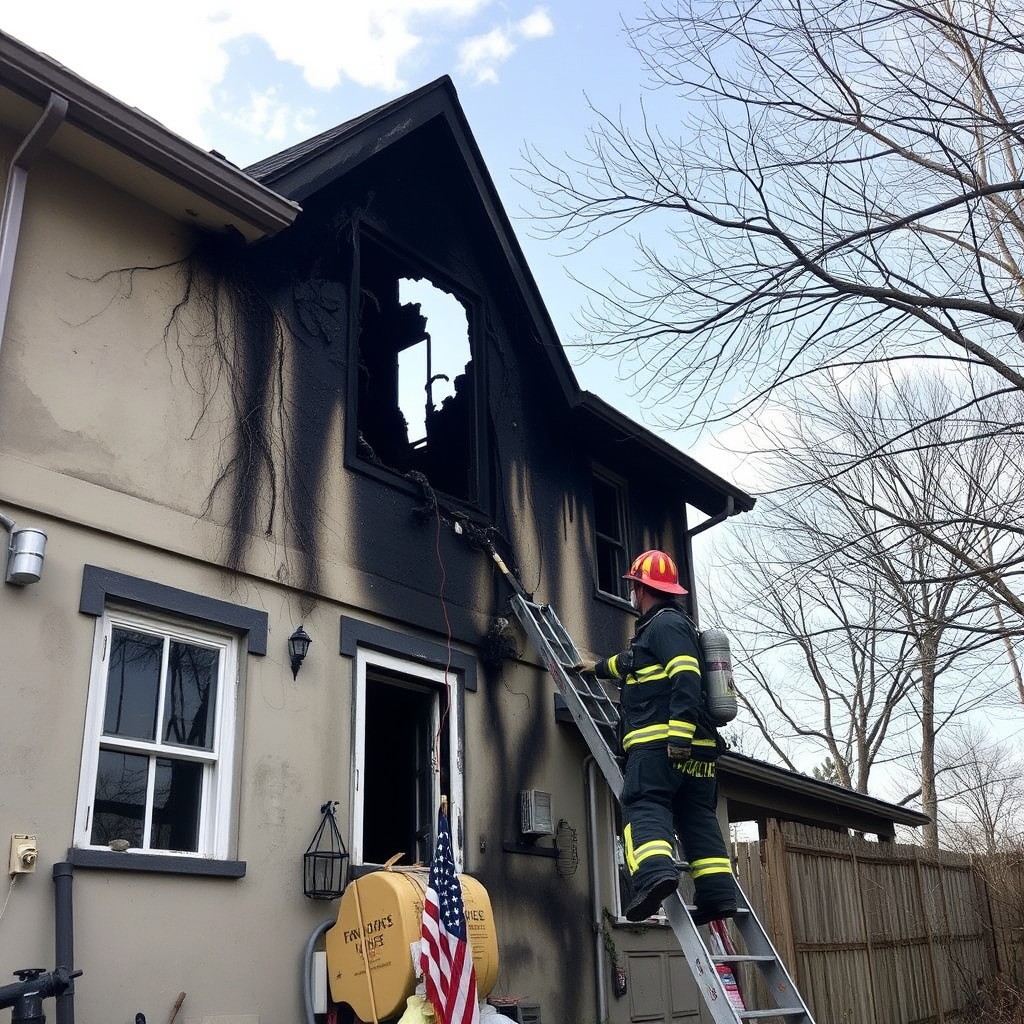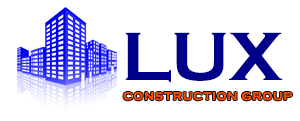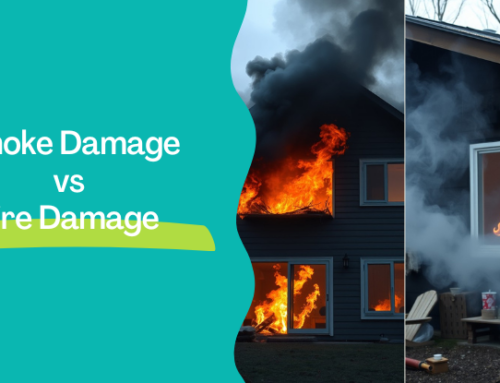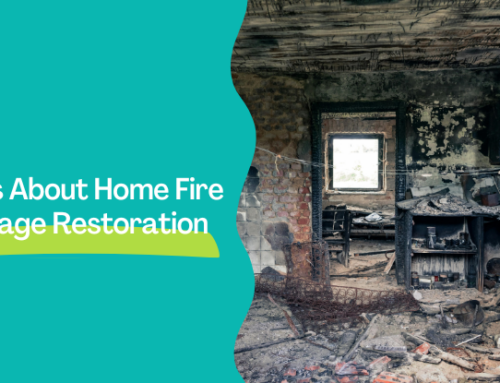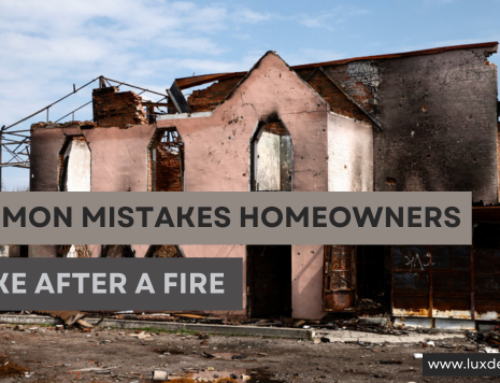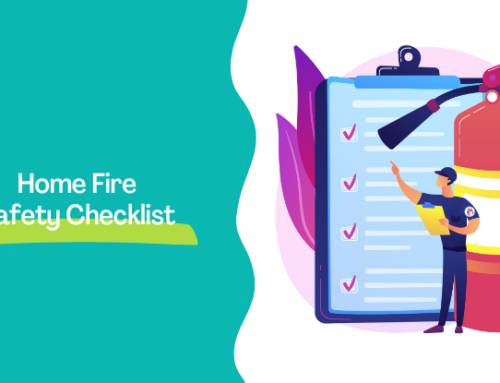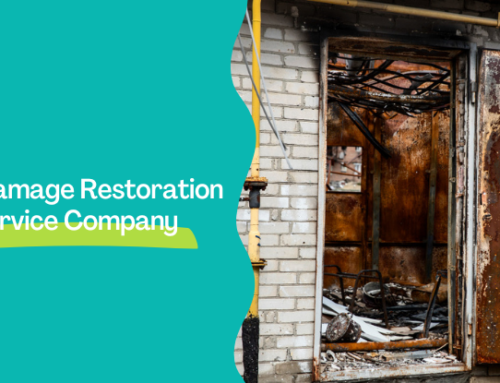A house fire can be one of the most traumatic experiences a homeowner can face. The emotional toll can be overwhelming, and the practical challenges that follow can leave you feeling lost. In the immediate aftermath, it’s essential to stay grounded and take the right steps to protect your safety, your property, and your future.
This article provides a clear guide on the key Do’s and Don’ts after a fire, helping you navigate the recovery process efficiently. We’ll cover important safety measures, insurance claims, property protection, and emotional recovery, giving you the necessary tools to move forward after such a devastating event.
Contents
- First Things First: Safety and Immediate Actions
- Secure the Scene and Contact Authorities
- Contacting Your Insurance Provider
- Preserving Your Property (If Safe to Do So)
- Emotional and Practical Recovery
- Fire Damage Cleanup and Restoration
- Legal and Financial Considerations
- Preventing Future Fires
- Need Professional Assistance in Los Angeles?
First Things First: Safety and Immediate Actions
In the moments after a fire, your first priority is personal safety. Fires can cause hidden hazards that may linger even after flames are out, so quick and cautious action matters.
✅ Do:
Leave the property immediately if there’s any sign of danger. Even after the fire is extinguished, risks like structural collapse, smoldering hot spots, or toxic fumes can remain.
Call 911 or your local emergency services. Firefighters and police will secure the scene and ensure everyone’s safety. If anyone has injuries or symptoms of smoke inhalation—such as coughing, dizziness, or shortness of breath—seek medical attention without delay. According to the CDC, more than half of fire-related deaths result from smoke inhalation, not burns.
❌ Don’t:
Re-enter the property until it’s officially declared safe by fire officials. What looks secure might be compromised beneath the surface.
Avoid touching or moving debris or damaged belongings. These could be structurally unsound or harmful, and disturbing the scene might interfere with insurance inspections or fire investigations.
Remaining calm, alert, and informed during these initial steps will lay the foundation for a safer recovery.
Secure the Scene and Contact Authorities
Once the immediate danger has passed, securing your property and notifying the right people becomes your next step. This helps prevent further damage, ensures safety, and starts the recovery process efficiently.
✅ Do:
Reach out to your utility providers right away. Inform your local gas, electricity, and water services about the fire so they can inspect and, if necessary, shut off the lines. This prevents hazards like gas leaks or electrical shorts, which often cause secondary damage after fires.
Get in touch with local disaster relief services such as the American Red Cross or community-based aid programs in Los Angeles. These organizations often provide temporary housing, food, clothing, and even counseling support.
If you’re a renter, notify your landlord or property manager immediately. They are responsible for structural repairs and may need to coordinate with their own insurance or contractors.
❌ Don’t:
Never try to turn utilities back on by yourself, even if it seems safe. Faulty wiring or hidden leaks can be fatal.
Don’t ignore signs of structural weakness—cracks in walls, sagging floors, or damaged roofing could point to deeper issues. According to the National Fire Protection Association, about 30% of residential fires result in compromised home structures that require professional assessment.
Acting quickly but carefully in this stage ensures that professionals can step in before further problems develop.
Contacting Your Insurance Provider
Communicating with your insurance company is one of the most critical steps after a fire. It can affect how quickly you receive assistance and how much of your losses are ultimately covered.
✅ Do:
Contact your insurance provider as soon as you’re safe and able to make a call. Most homeowner policies require prompt reporting—some within 24 to 72 hours. Early communication also speeds up the claims process, letting you access emergency funds for housing or repairs.
Document everything. Take clear photos and videos of every damaged room, item, and structural element. If possible, capture different angles and lighting. Insurance adjusters use this evidence to estimate your compensation.
Start building a detailed inventory list. Include all damaged or lost items—furniture, appliances, clothing, electronics—and try to note purchase dates and approximate values. Tools like spreadsheets or home inventory apps can help. According to Insurance Information Institute (III), a well-prepared home inventory can improve claim accuracy by up to 50%.
❌ Don’t:
Avoid discarding any damaged items until your insurer gives you the go-ahead. Even burnt or waterlogged possessions might be essential for claim validation.
Don’t wait to file your claim. Every policy has its own deadlines, and delays could result in reduced or denied compensation. Keep a copy of every communication—emails, letters, or claim numbers—for future reference.
By being thorough and timely, you set yourself up for a smoother recovery and reduce the chance of financial stress during an already difficult time.
Preserving Your Property (If Safe to Do So)
Once fire officials deem your property safe to enter, it’s important to take steps to secure it from further harm—without interfering with the claims process or creating new risks.
✅ Do:
If windows or doors were damaged during the fire or while firefighters were accessing the home, board them up. This prevents theft, vandalism, or exposure to rain and wind. However, only do this after your insurer or fire marshal grants permission. In Los Angeles, it’s common for restoration companies to offer emergency board-up services within hours, which helps reduce liability on the property owner’s part.
Protect anything salvageable from the elements. That might mean using waterproof tarps over roof openings or covering furniture with plastic sheeting to prevent mold. These small actions can reduce long-term repair costs.
If permitted by officials, you can remove valuables like personal documents, family heirlooms, and medication. Place them in a secure, off-site location. FEMA recommends storing essential documents—such as birth certificates, insurance policies, and identification—in a fireproof box going forward.
❌ Don’t:
Avoid any major cleanup efforts before the insurance company finishes their inspection. Moving or altering damaged areas can affect how your claim is evaluated and may lead to disputes or reduced payouts.
Don’t use appliances or electronics that were exposed to smoke, flames, or water. Electrical systems and circuits are particularly vulnerable after a fire, and using them prematurely could result in shock, further damage, or secondary fires.
Preserving your home responsibly helps maintain your insurance coverage and prepares the ground for professional restoration.
Emotional and Practical Recovery
Recovering from a home fire isn’t just about rebuilding walls—it’s also about restoring your well-being and daily life. Emotional recovery often takes longer than physical repairs, and managing both sides is key to moving forward.
✅ Do:
Find temporary housing that feels safe and stable. Whether through family, friends, or local relief organizations like the Red Cross or Los Angeles Housing Services Authority (LAHSA), having a secure place to stay helps reduce stress and gives you space to plan your next steps. Many insurance policies also offer coverage for additional living expenses (ALE), including hotel stays and meals.
Let your workplace and your children’s schools know what happened. Most employers and institutions are understanding in these situations and can offer flexible arrangements. According to the American Psychological Association, stability and communication are vital during times of trauma, especially for children.
Don’t hesitate to seek emotional support. Fire survivors often experience anxiety, sleep issues, and even PTSD. Talking with a licensed counselor or joining a local support group can make a significant difference. In Los Angeles, free mental health services are available through county programs and nonprofit partners.
❌ Don’t:
Avoid brushing off the emotional impact. Just because you escaped unharmed doesn’t mean the experience won’t leave lasting effects. It’s normal to feel grief, anger, or helplessness after losing your home.
Don’t rush back into daily routines without checking in on your mental state or your family’s. Give yourself permission to heal—emotionally and practically—before trying to resume “normal” life.
Acknowledging the emotional side of recovery ensures a healthier, more sustainable path forward.
Fire Damage Cleanup and Restoration
Cleaning up after a fire is more than sweeping ashes—it’s a specialized process that requires expert handling. Smoke, soot, and water damage can hide beneath surfaces, and improper cleanup can create long-term health and structural issues.
✅ Do:
Hire certified fire damage restoration professionals to manage the cleanup process. These companies have the tools and training to safely remove debris, clean soot from walls and ceilings, and eliminate water damage caused by firefighting efforts. In Los Angeles, firms certified by the Institute of Inspection Cleaning and Restoration Certification (IICRC) are considered the industry standard.
Always verify credentials before hiring. Look for reviews, business licenses, and certifications. Trustworthy companies will conduct a full inspection and give you a written estimate. According to a study published in the Journal of Environmental Health, professional fire remediation significantly reduces the risk of mold growth and airborne contaminants after a fire.
❌ Don’t:
Do not attempt to clean soot, ash, or smoke-damaged surfaces yourself. Soot particles are acidic and can stain or corrode materials if handled incorrectly. Using the wrong cleaner can actually embed particles deeper into fabrics or surfaces.
Avoid overlooking hidden damage. Even if a room looks untouched, heat and smoke can travel through air ducts, insulation, and wiring. These areas must be checked by qualified professionals to ensure safety and prevent future issues like electrical fires or respiratory problems.
Taking the time to hire the right restoration team can protect both your health and the long-term value of your home.
Legal and Financial Considerations
In the aftermath of a fire, managing the legal and financial details is just as important as restoring the structure. Staying organized and informed will help protect your rights and ensure you’re properly compensated.
✅ Do:
Keep detailed records of every expense related to the fire. This includes receipts for temporary housing, meals, transportation, clothing, and emergency repairs. Most homeowners’ insurance policies reimburse these costs under additional living expenses (ALE) coverage, but only with proper documentation.
If there are disagreements with your landlord, neighbor, or insurer—especially over liability, negligence, or policy interpretation—it’s wise to consult with a legal expert. California has tenant protection laws that may apply if you rent, and fire-related disputes often benefit from legal guidance to avoid delays or missed claims.
❌ Don’t:
Avoid signing contracts with restoration or repair contractors without researching their background. In disaster situations, unlicensed or predatory contractors sometimes target vulnerable homeowners. In California, contractors must be licensed through the Contractors State License Board (CSLB), and their credentials should always be verified.
Don’t assume that your insurance will cover every cost. Read your policy closely to understand coverage limits, exclusions, and deductibles. Items like landscaping, exterior sheds, or rare collectibles may not be covered unless previously declared. If needed, request a certified copy of your full policy to better understand your rights and responsibilities.
Handling legal and financial steps carefully will reduce long-term stress and make the road to full recovery more manageable.
Preventing Future Fires
Once recovery begins, it’s a good time to strengthen your home’s safety against future fire risks. Many house fires are preventable with consistent maintenance, safety checks, and small lifestyle changes.
✅ Do:
Install smoke alarms in every sleeping area, hallway, and on every level of the home. Test them monthly and replace batteries twice a year. According to the National Fire Protection Association (NFPA), households with working smoke detectors cut their risk of fire-related death by 55%.
Create a fire escape plan with at least two exit routes from each room. Practice this plan with everyone in the household—including children and elderly family members—at least once every six months. In Los Angeles, the local fire department even offers resources and templates for home fire drills.
Keep a fire extinguisher in key areas like the kitchen, garage, and near heating sources. Make sure everyone in the household knows how to use one. Also, install carbon monoxide detectors if you use gas heating or appliances.
❌ Don’t:
Do not ignore warning signs like frayed cords, flickering lights, or outlets that feel warm. These can point to underlying electrical issues, which are one of the leading causes of house fires.
Avoid storing flammable materials—such as propane, gasoline, or oily rags—near heat sources. Keep them in proper containers, away from living spaces, and dispose of them safely when no longer needed.
Taking these preventative steps not only protects your home but also gives peace of mind moving forward.
Need Professional Assistance in Los Angeles?
Recovering from a house fire is a process that takes time, experience, and the right support. Once the flames are gone, what comes next can feel overwhelming—but you don’t have to handle it alone. For homeowners in Los Angeles, professional help is just a call away.
LuxDevla Construction Group specializes in fire damage restoration services, bringing years of expertise and attention to detail to every project. From structural assessments to full-scale renovations, their team understands the urgency and complexity of restoring a fire-damaged home.
They work directly with your insurance provider, helping you navigate paperwork and claims while focusing on getting your home back to a livable condition. Whether you need emergency board-up, smoke odor removal, or complete reconstruction, LuxDevla ensures every step is handled with care and precision.
Why choose LuxDevla?
- Deep experience in post-fire home restoration and repairs
- Fast response times and clear communication throughout the process
- A trusted local reputation in Los Angeles for quality, compliance, and compassion
- Certified professionals with up-to-date knowledge of California building codes
If you’ve been affected by a home fire, don’t wait. Let LuxDevla help rebuild not just your house—but your peace of mind.

